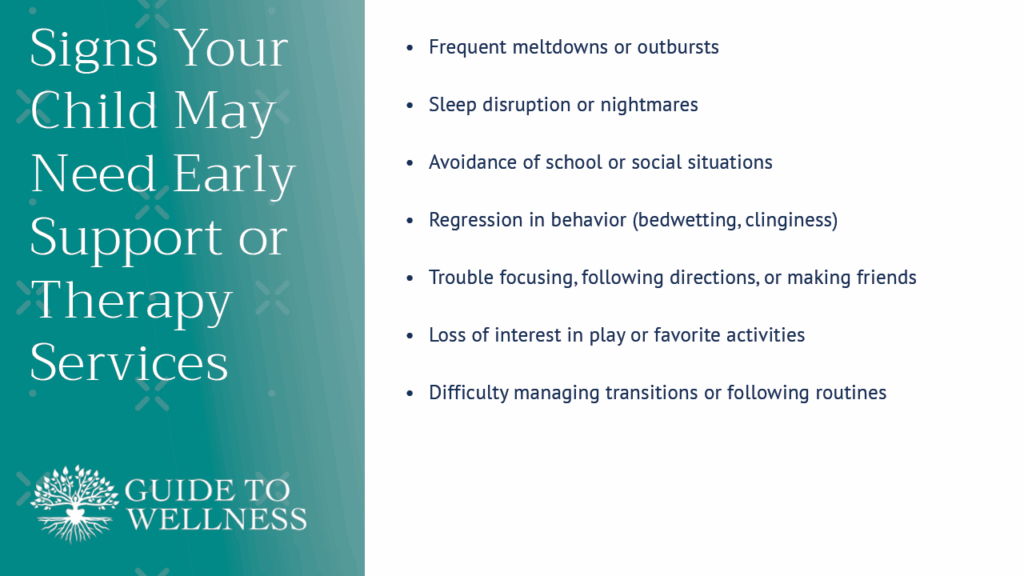Just like adults, kids experience stress, anxiety, sadness, and anger. But unlike adults, they often don’t have the language to explain what they’re feeling. Instead, those big feelings often show up in sleep issues, problem behaviors, challenges at school, or emotional outbursts.
At Guide to Wellness, we believe every child’s life is full of potential, and with the right support, they can learn to navigate their world with confidence, curiosity, and resilience. Our team brings love and dedication to supporting children and families every step of the way. Big feelings in little bodies can be overwhelming for both children and their parents. We specialize in helping kids express themselves, learn healthy coping strategies, and feel safe in their world again.
Our whole child approach considers all aspects of a child’s development, emotional, social, cognitive, and physical, to ensure comprehensive care. Our children’s therapy and support services are designed to meet each child where they are and help them grow in a way that honors their individuality.
Discover therapy services designed to meet your child’s unique needs—because early support leads to lifelong emotional success. Reach out to Guide to Wellness today.
Kids Experience Stress Too—And It Shows
Changes at school, in the home, or in relationships can have a real impact on your child’s emotional and mental health. Children and parents are experiencing struggles related to these changes, which can be overwhelming. There is a wide range of diagnoses, such as anxiety, ADHD, autism, and depression, that can affect children. According tothe National Survey of Children’s Health, in 2023, over 5.3 million teens ages 12 to 17, or about 1 in 5, were living with a diagnosed mental or behavioral health condition such as anxiety, depression, or conduct-related issues. Whether they’re struggling with anxiety, ADHD, autism, depression, or simply having a hard time adjusting to a new life stage, therapy can help.
Because children often don’t talk about how they’re feeling, parents may notice physical complaints (like headaches or stomachaches), defiance, sensory processing challenges, or problem behaviors like aggression or withdrawal. It is important to understand the specific problems your child is facing in order to provide the right support. Communication is a key part of helping children express their feelings and needs.
Therapy is also a learning process, helping children develop new skills and coping strategies. These challenges can affect children of all ages, from infants to adolescents, and require age-appropriate interventions. Parents need accurate information about available resources and support to help their child. These aren’t just “bad behaviors”—they’re signals that your child needs guidance and support, and a comprehensive treatment approach can address these issues effectively.
Signs Your Child Might Need Support
Every child is different, but here are some signs that may indicate the need for early support or therapy services:
- Frequent meltdowns or outbursts
- Sleep disruption or nightmares
- Avoidance of school or social situations
- Regression in behavior (bedwetting, clinginess)
- Trouble focusing, following directions, or making friends
- Loss of interest in play or favorite activities
- Difficulty managing transitions or following routines
A combination of these signs may indicate the need for additional support, as they can point to underlying problems that require attention. Parents are encouraged to set goals for their child’s progress and bring any questions they have—our team is ready to answer and provide the information you need to make informed decisions.
Our approach involves a thorough assessment of these signs, which may be related to certain diagnoses. We offer a range of treatment options tailored to your child’s needs. These signs can be linked to specific problems, and recognizing them early can make a significant difference. It’s important to note that these signs can appear at different ages, from infants to adolescents, and our interventions are tailored accordingly.
If these behaviors last more than a few weeks or disrupt daily function, it’s time to consider a professional evaluation and therapy plan. Early support can prevent long-term challenges and help your child develop healthy emotional patterns.
How We Make Therapy Safe and Fun for Kids
Children communicate best through play, stories, movement, and creativity, not just words. That’s why our therapists use a comprehensive approach, utilizing a combination of therapies such as occupational therapy (OT), ABA, and communication-focused interventions. These evidence-based approaches, like play therapy, art, and games, create a safe and engaging space where kids can be themselves.
Therapy might involve:
- Drawing or storytelling to explore emotions
- Role-play with puppets or dolls
- Practicing calming skills through games and breathing exercises
- Talking through challenges in age-appropriate ways
- Teaching children to express their thoughts and improve communication
Our goal is to meet each child at their developmental level and help them build the tools they need to express their feelings, improve behavior, and feel more confident navigating the world around them. Through individualized treatment, children can achieve significant improvements in communication, learning, and social-emotional skills. We set clear goals for each therapy plan to ensure progress. Our services support a wide range of diagnoses and ages, from infants to adolescents, tailoring our approach to each child’s unique needs.
Partnering With Parents Every Step of the Way
We believe that therapy works best when caregivers are involved. Our family-centered approach ensures that parents and children are at the heart of everything we do. We are dedicated to supporting parents and families throughout the therapy journey. Our collaborative approach brings together therapists, families, and other professionals to maximize each child’s potential.
From the very first session, our team works closely with families to build a collaborative therapy plan that reflects your child’s needs and your goals. We provide clear information to parents about therapy options and progress. Parents are encouraged to bring their questions, and our team is always ready to answer and address any concerns. We recognize the importance of community in supporting families and connecting you with local resources.
You’ll have the chance to participate actively in your child’s therapy. We teach parents practical strategies to use at home and help set meaningful goals for therapy. You’ll receive regular updates, parent coaching, and help implementing strategies at home—because when the whole family is engaged, children thrive. Our focus is on each family’s unique needs, using a combination of evidence-based strategies to support a wide range of diagnoses and treatment options. We celebrate the success and improvements families achieve together.
Whether you’re navigating a recent diagnosis, addressing behavioral challenges, or seeking tools to help your child adapt, we’re here to assist you every step of the way.
Telehealth Therapy for Busy Families—Wherever You Are
Life with kids is busy. Between school, work, and activities, getting to the office may not always be easy. That’s why we offer virtual therapy services that bring compassionate, high-quality care right to your home. Our virtual approach is designed to be flexible and accessible, ensuring families can receive support wherever they are. We provide clear information to families about telehealth options, so you can make informed decisions about your child’s care. We invite families to bring their questions—our team is always ready to answer and guide you through the process.
Community is at the heart of our telehealth services, helping families stay connected and supported. With telehealth, families have the chance to access therapy from anywhere, making care more convenient and inclusive.
Telehealth allows your child to connect with a trusted therapist from the comfort of their space. We are committed to supporting families through virtual care, ensuring you feel confident and empowered every step of the way. Our child-centered telehealth services are designed to put your child’s needs first. We focus on each child’s unique needs in a virtual setting, using a personalized approach to maximize outcomes.
Teletherapy is especially helpful for families with transportation challenges, living in rural areas, or juggling multiple children and commitments.
Helping Little Voices Grow Stronger
Every child deserves to feel heard, seen, and supported. With the right mix of connection, compassion, and interventions, therapy can help children develop the tools they need to manage emotions, form healthy relationships, and navigate their world with confidence.
At Guide to Wellness, our dedicated team is here to help your child build new skills, strengthen emotional resilience, and find their voice, no matter how big their feelings are.
Let our team create a therapy plan that helps your child develop new skills, reduce problem behaviors, and feel more confident. Contact us today.






